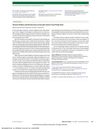 18 citations,
December 2014 in “Obstetrics and Gynecology Clinics of North America”
18 citations,
December 2014 in “Obstetrics and Gynecology Clinics of North America” Losing 5-10% body weight can improve PCOS symptoms, letrozole is better than clomiphene for fertility, and managing weight and blood sugar is important to reduce pregnancy complications.
 20 citations,
January 2014 in “Journal of skin cancer”
20 citations,
January 2014 in “Journal of skin cancer” Most people with basal cell carcinoma on their head or neck were 60-70 years old, and it often came back even after being fully removed, especially in certain areas and types.
 271 citations,
June 2013 in “Human Reproduction”
271 citations,
June 2013 in “Human Reproduction” PCOS is common among Chinese women of reproductive age and linked to serious metabolic and reproductive issues, especially in obese women.
[object Object]  9 citations,
November 2015 in “Gynecological Endocrinology”
9 citations,
November 2015 in “Gynecological Endocrinology” Different types of PCOS in Chinese Han women show varying levels of male hormone and metabolic issues.
 August 2018 in “Journal of the American Academy of Dermatology”
August 2018 in “Journal of the American Academy of Dermatology” Patients often experience long-lasting changes to their hair after stem cell transplants.
 69 citations,
November 2010 in “Middle East Fertility Society Journal”
69 citations,
November 2010 in “Middle East Fertility Society Journal” PCOS affects women's health by increasing the risk of diabetes, heart disease, and reproductive issues.
 7 citations,
July 2015 in “Parasitology Research”
7 citations,
July 2015 in “Parasitology Research” Seresto® collar is safe to use with Advocate® and Profender® on dogs and cats.
 138 citations,
May 2000 in “Maturitas”
138 citations,
May 2000 in “Maturitas” Estrogen replacement can improve skin health in menopausal women but doesn't reverse sun damage or prevent hair loss.
1 citations,
December 2023 in “Biomolecules” Regulating cell death in hair follicles can help prevent hair loss and promote hair growth.
 1 citations,
May 2022 in “IntechOpen eBooks”
1 citations,
May 2022 in “IntechOpen eBooks” Obesity leads to physical, metabolic, reproductive issues, higher healthcare costs, and mental health problems.
 2 citations,
September 2018 in “Tissue Engineering Part A”
2 citations,
September 2018 in “Tissue Engineering Part A” Xeno-free three-dimensional stem cell masses are safe and effective for improving blood flow and tissue repair in limb ischemia.
 125 citations,
January 1999 in “Drugs”
125 citations,
January 1999 in “Drugs” Finasteride effectively treats baldness but may cause sexual side effects.
 1 citations,
October 2023 in “Romanian Journal of Morphology and Embryology”
1 citations,
October 2023 in “Romanian Journal of Morphology and Embryology” COVID-19 can cause various skin issues, but long-term skin problems are rare.
 7 citations,
August 2018 in “South African Medical Journal”
7 citations,
August 2018 in “South African Medical Journal” Clinicians should understand tattoos to manage health issues, as tattoos can cause complications and affect medical assessments.
 34 citations,
January 2011 in “Fundamental & Clinical Pharmacology”
34 citations,
January 2011 in “Fundamental & Clinical Pharmacology” New treatments for PCOS show promise, but no current medication treats all aspects of the condition.
 36 citations,
January 2014 in “The Journal of Sexual Medicine”
36 citations,
January 2014 in “The Journal of Sexual Medicine” Testosterone may help increase sexual events for women with low libido due to antidepressants.
 22 citations,
March 2021 in “Journal of Cutaneous Medicine and Surgery”
22 citations,
March 2021 in “Journal of Cutaneous Medicine and Surgery” Ultrasound is a useful, non-invasive tool in dermatology for diagnosing skin conditions and guiding treatments, but it has some limitations.
 68 citations,
June 2005 in “Expert Opinion on Therapeutic Targets”
68 citations,
June 2005 in “Expert Opinion on Therapeutic Targets” Oestrogens help maintain healthy skin, heal wounds, and may protect against skin aging and cancer.
 18 citations,
May 2014 in “Menopause”
18 citations,
May 2014 in “Menopause” A 5 mg dose of transdermal testosterone cream effectively restores testosterone levels in postmenopausal women.
 10 citations,
September 2013 in “Veterinary dermatology”
10 citations,
September 2013 in “Veterinary dermatology” Medroxyprogesterone injections caused hair regrowth in some dogs with alopecia X.
 10 citations,
June 2006 in “Fertility and Sterility”
10 citations,
June 2006 in “Fertility and Sterility” The conclusion is that metformin is a first-line treatment for PCOS, particularly for restoring ovulation and increasing pregnancy rates, with other treatments depending on specific symptoms.
3 citations,
March 2012 in “Journal of the Egyptian Public Health Association /Journal of the Egyptian Public Health Association” General practitioners in Qassim have satisfactory knowledge of alopecia areata but need more education to address gaps and misconceptions.
 May 2017 in “InTech eBooks”
May 2017 in “InTech eBooks” Early treatment of children's hair loss, which can be caused by various factors, is important due to its emotional impact.
 1 citations,
January 2021 in “Arthritis Research & Therapy”
1 citations,
January 2021 in “Arthritis Research & Therapy” About 8% of people with systemic lupus erythematosus have chronic scarring alopecia, with certain symptoms and positive antibodies increasing the risk, while immunosuppressants may lower it.
 January 2023 in “Advances in reproductive sciences”
January 2023 in “Advances in reproductive sciences” Higher levels of the protein Pannexin-1 may play a role in hair loss in women with PCOS.
 May 2022 in “Journal of the American Academy of Dermatology”
May 2022 in “Journal of the American Academy of Dermatology” The document suggests using a topical Vitamin D treatment for hair loss rather than oral supplements and calls for more research.
[object Object]  52 citations,
October 2004 in “Veterinary dermatology”
52 citations,
October 2004 in “Veterinary dermatology” Melatonin and mitotane treatment led to hair re-growth in 62% of dogs with Alopecia X, but this was not always linked to normal hormone levels.
 1 citations,
June 2018 in “JAMA Dermatology”
1 citations,
June 2018 in “JAMA Dermatology” Vitamin C was found to effectively treat prickly heat in children.

A patient with patchy hair loss was successfully treated for Tumid Lupus Erythematosus after other treatments failed.
 July 2021 in “Open access journal of biomedical science”
July 2021 in “Open access journal of biomedical science” A lotion with natural extracts significantly sped up hair growth in women with hair loss from chemotherapy.



























